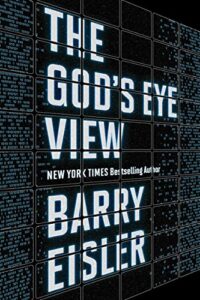In June 2013, Edward Snowden provided reporter Glenn Greenwald with top secret documents from the NSA. It was the first of many leaks Snowden would supply to various media organizations. Those leaks revealed both the breadth and depth of the US government’s surveillance programs.
The leaks ignited a firestorm of controversy. People were appalled at the amount of information the government was collecting from individuals around the world, including its own citizens. Reforms of surveillance programs were requested, demanded even.
Were these reforms ever implemented? We’ll never know.
One would be naive to think our government no longer collects people’s personal information, listens to their private conversations, or monitors their movements. I’m convinced the government is collecting even more data about us than when Snowden made his revelations.
Apparently, I’m not the only one who thinks this way. In his fictional novel, The God’s Eye View, author Barry Eisler explores how the government might still be collecting data on us, and the consequences of such a program if a megalomaniac happened to be in charge of the agency responsible for safeguarding that information.
Had Eisler’s book been written 20 or 25 years ago, it would have been viewed as a book based on paranoia and fear. While people may have thought the government was collecting information on people, they would have assumed that it was doing it primarily to monitor and expose criminal activities. People who talked about the government spying on its own, innocent citizens were branded conspiracy theorists.
Fast forward to present day, and these fears are no longer unfounded. The vast number of devices collecting data on us continues to grow. It includes our computers, mobile phones, speakers, doorbells, security cameras, and those are just a sampling. In practically all of those devices, the government has found a way to hack into them to collect data that it can use to track and monitor any individual it wants, at any point in time.
In The God’s Eye View, Eisler explores various scenarios of how the government could track someone, both at home and abroad. He shows the tricks one must play and hoops one has to jump through to avoid surveillance. Not to spoil it, but it’s nearly impossible unless you’re on the inside. Even then, it highly unlikely you’ll escape detection.
Eisler then shows how the person in charge, who has knowledge of and access to the information, could abuse this power for personal gain. Of course, the leader rationalizes it under the guise of our country’s security and the safety of our people, but it makes you wonder. We are entrusting those in power with a lot of information about ourselves, yet do we really know and understand how it is being used? Do we even want to know?
The God’s Eye View is an interesting book if you are interested in how the government collects information and the perils of a mass surveillance society. Otherwise, the story itself is OK, with a somewhat predictable plot and pedestrian characters. In my opinion, though, you’re not reading the book for the story. You’ll want to read it to be informed about how the government can monitor you, the data they can collect, and how the devices you use and have come to rely on daily can and are being used to monitor your activities.
Privacy is a topic that I am deeply concerned about. Since I don’t want to completely hijack this book review with my personal views on the subject, I’ll simply list below the other articles I’ve written in the past which you may find interesting.

